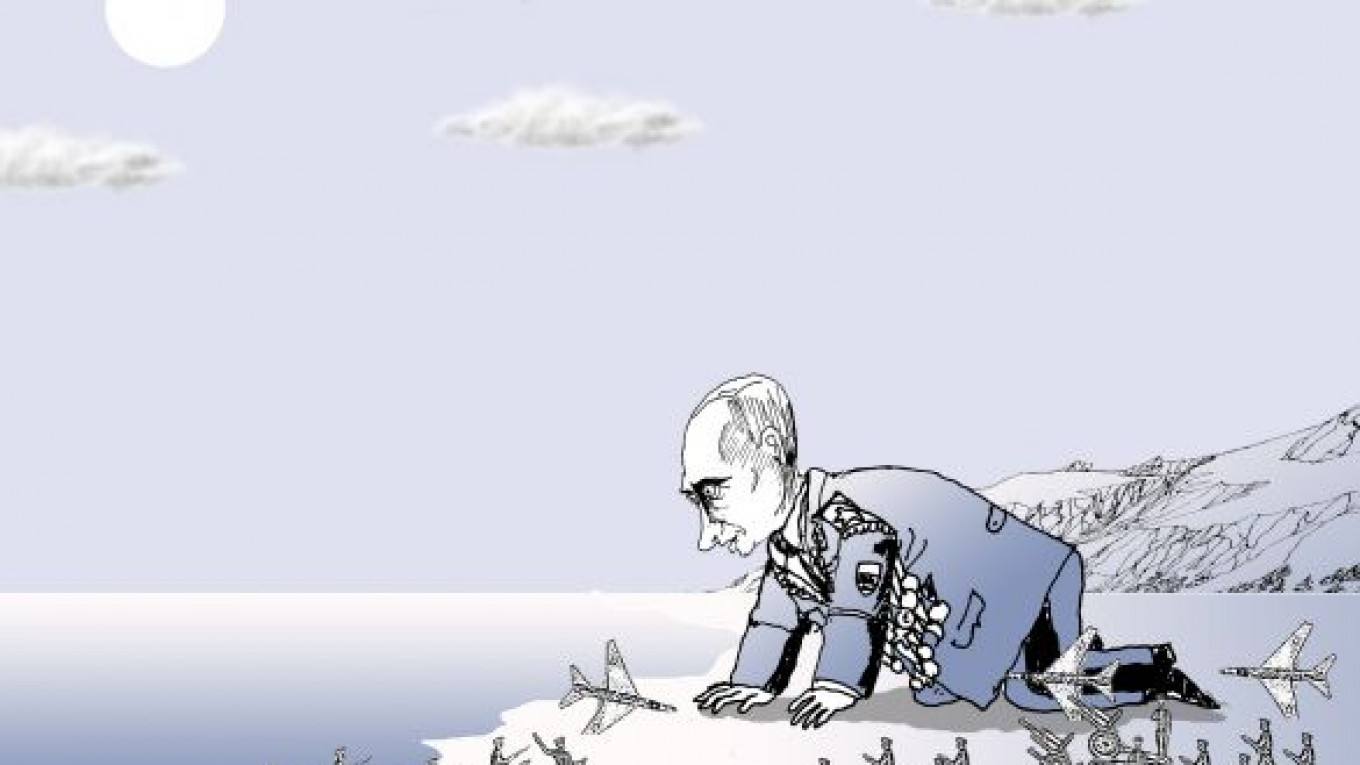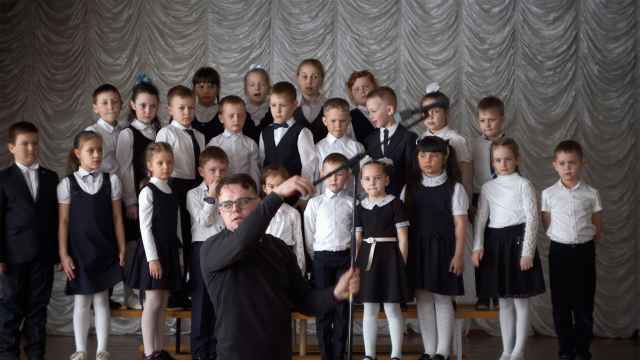The enemy landed troops near Novorossiisk, but the Russian military command was not caught unaware. A motorized infantry brigade from Vladikavkaz was quickly brought in and sent into battle. With skillful maneuvering and counterattacks, the Russian soldiers fought back the enemy. The actions of the brigade were supported with fire from self-propelled artillery weapons systems. Su-25 attack planes delivered an additional massive strike, along with Su-24 frontline bombers and assault helicopters. They were joined by Tu-160 bombers, which destroyed the enemy's strategic installations. The result: Enemy forces were decisively defeated.
This was the scenario that the Southern Federal District strategic command enacted in the Caucasus 2012 war games last week, while the commander in chief, President Vladimir Putin, proudly observed the first part of the huge military spectacle. He was pleased with what he saw and personally bestowed awards on those who had distinguished themselves during the first day of maneuvers. (Normally, awards are given at the conclusion of the battle, but Putin apparently had a scheduling conflict and decided to hand out the honors in advance.)
"Here, the most important elements of modern-type combat are employed, not just on maps, but in field conditions, improving training and mastery for commanders and soldiers," Putin told a group of soldiers and officers who took part in the exercise. "Overall, this is how we should shape the new Russian Army and Navy and strengthen our national defense potential. … The armed forces must demonstrate their preparedness to defend our national interests and show that they are ready to decisively rebuff any threats or challenges to Russia's national security."
But what potential threat were these war games designed to address? The only forces capable of mounting such a large-scale landing operation are the United States and China. But China would be unlikely to invade by sea, particularly considering that it shares a nearly 1,000-kilometer border with Russia. The only other likely possibility is that the Novorossiisk games were preparation for repelling a massive attack by U.S. troops.
If that is the case, these maneuvers were about as useful to national security as the reconstruction of the Battle of Borodino that Putin observed a few weeks ago. This battle was much like the maneuvers carried out by the U.S. 1st Cavalry Armored Division that I observed in 1990.
The reason is that a revolution in military affairs has taken place since 1990. The United States — and probably China — has now adopted network-centric warfare, meaning that it will not land troops on the battlefield and fly directly over enemy targets to destroy them. Instead, satellites identify targets and transmit their coordinates to remote combat aircraft that quickly destroy the enemy's troops and equipment with a push of a button. Only about four minutes elapses between a target's detection and destruction. During the war in Iraq, Saddam Hussein's generals tried to mount counterattacks several times, but the U.S. destroyed their forces the moment they began moving toward the staging area, using aircraft that were flying hundreds of kilometers outside the range of Iraqi air-defense missiles.
Why would an aggressor possessing sophisticated, ultramodern technology allow Russia's infantry brigade to advance more than 700 kilometers without attacking it while en route? Why were Russian planes used only to land paratroopers and not to defend their own troops from the inevitable attacks by enemy aircraft?
Perhaps the reason is that the Southern Federal District — and maybe the entire Russian armed forces — does not need a fleet of modern combat aircraft to disrupt the air and space operations of a technologically advanced enemy.
What's more, the motorized infantry brigade that so masterfully mounted a defense is hardly big enough to be considered a brigade at all. Izvestia reported that it took a call-up of 300 reservists just to fill out the ranks enough to stage these maneuvers.
Meanwhile, the military brass has repeatedly proclaimed that the recent military reforms have enabled leaders to create large battle-ready units that can quickly start fighting without the need for reservists. From now on, according to Interfax, brigades will be broken down into smaller battalions of tactical groups, and only those reinforced battalions will be fully manned.
The problem is obvious: The demographic situation in Russia makes it impossible to staff a million-man army. But not a single military commander would risk informing the commander in chief of this fact. Instead, the head of the General Staff tediously insisted that the recent maneuvers proved that the armed forces are capable of repelling external aggressors or resolving an internal conflict. Perhaps Putin wants a million-man army to put down any possible color revolution or maintain Russia's superpower status.
Military commanders staged the pointless war games in Novorossiisk for one reason only: to enable Putin to go on believing that Russia is still a great power.
Alexander Golts is deputy editor of the online newspaper Yezhednevny Zhurnal.
Related articles:
A Message from The Moscow Times:
Dear readers,
We are facing unprecedented challenges. Russia's Prosecutor General's Office has designated The Moscow Times as an "undesirable" organization, criminalizing our work and putting our staff at risk of prosecution. This follows our earlier unjust labeling as a "foreign agent."
These actions are direct attempts to silence independent journalism in Russia. The authorities claim our work "discredits the decisions of the Russian leadership." We see things differently: we strive to provide accurate, unbiased reporting on Russia.
We, the journalists of The Moscow Times, refuse to be silenced. But to continue our work, we need your help.
Your support, no matter how small, makes a world of difference. If you can, please support us monthly starting from just $2. It's quick to set up, and every contribution makes a significant impact.
By supporting The Moscow Times, you're defending open, independent journalism in the face of repression. Thank you for standing with us.
Remind me later.







